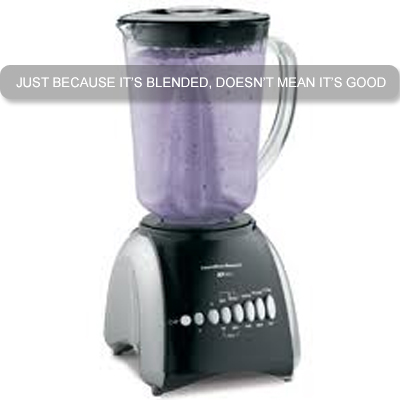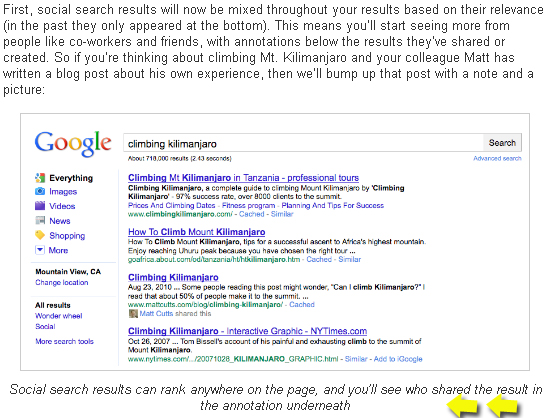It’s hard to actually write that in the title. Is it possible that G+ could actually compete with Facebook? Check out this infographic from Social Annex, what do you think?


It’s hard to actually write that in the title. Is it possible that G+ could actually compete with Facebook? Check out this infographic from Social Annex, what do you think?


This morning’s thought: “I now need to go back and look at all my recent SEO work.”
I like the competition of search. Every day is different and you have the ability and or the chance to “win” so to speak. It’ similar to watching the standings in Major League Baseball. Some days you may gain on the competition, other days you lose ground, and still others, nothing changes.
That’s the nature of competing against Google and it’s algorithm changes. It’s cat and mouse. The pursuer and the pursued. That’s why any article or blog post that talks about Google and search engine optimization has to be paid attention to. Sometimes, and I mean sometimes, there can be nuggets or threads of truth that can help you get a leg up on two targets that are constantly moving in the digital space. The customer and Google search.
How fun and frustrating can it get? Well, to the extent that after reading a post from Search Engine Land that Google would neither affirm no refute titled Ex-Googler: “To Please Google With Your SEO, Forget About SEO”, I started this post with that opening thought.
It’s OK, it happens all the time and actually as an “SEO’er” you should of kind of always be thinking that way anway-How can you improve organic search rankings? When you’re done reading the Search Engine Land post, go over to Forbes and read a pretty good article as well on SEO titled, The 6 Basic Components Of A Strong SEO Strategy For Online Retailers. It ties and supports the other post better and as recent as I’ve seen in quite a while in regards to what you need to think about when it comes to SEO.
It’s all good though. All of it keeps you on your toes. With that said, go read both posts in their entirety. Below are some of the soundbites that got me thinking.
At this stage a webmaster is out of his mind to still rely on techniques that were common practice 8 months ago.”
…don’t dismiss directories completely.
and the best one of all…
Relevance is the new PR.”

Hey Google, you know me, but do you really know me? I know, I know, you have all that customer data and you’ve just changed, refined your privacy policy so I know you really know me but… we’ve known each other for at least 10 years and we’ve grown on each other but…I have a beef.
Just because I have people in my Google Plus Circles doesn’t mean that what they “might know” or talk about is necessarily the search result information that I was looking for or need. That’s great that you now make it come up above the fold, but that doesn’t always mean it’s going to benefit me. What it really means to me is that I now have to scroll through a bunch of stuff that may not matter in order to to get to a hopefully organic result.
Part of the attraction of Google has always been its simplistic interface tied into an algorithm that really understood that what we were looking for was the best, most relevant search result. Now what we get is a search result tied into a) Google’s latest foray into social and b) someone’s Google + social affiliation to me. This means that if I’m looking for information about violins. I may have to sift through a search result that incorporate’s my Circle’s random observations, musings, photos and videos of violins, when what I was looking for was where I could buy one in my city that was inexpensive and durable.
Google isn’t enhancing the search process with tying it into Google Plus, it’s assuming that it knows me and my circles and what is best for me when I search. You don’t want that, what you really want is this…
What we may have to start doing is redefining what a Google organic search result is. Sometimes, actually more times than not, I need and you do too, a search result that isn’t or hasn’t been influenced by nothing more than pure relevance to the topic at hand. It may not happen today or even next year or the year after that, but at some point, someone will build a better, cleaner search engine that will be what Google was when Google first launched.

It’s no secret to most of us in the digital world that Google’s track record in trying to roll out socially infused applications is not good. I can’t even remember the last time I checked in at Google Buzz. I’m starting to think that maybe Google Plus might fall into that category as well. Here’s why. Since it came out, I haven’t had time to use it. I see that I keep getting notifications of people who keep adding me but I really haven’t had nor have I really taken the time to organize it. And maybe that’s the problem. I need to organize it. I know, Twitter and Facebook allow you to do it to a certain degree, and I have organized them, so what gives?
Maybe this town ain’t big enough for another social network?
I can definitely verify that interest for me in Google+ is waning, but maybe there is a deeper issue here. What am I supposed to do with this other network if the same people I follow and communicate with on Facebook and Twitter appear on Google Plus? I wouldn’t go so far as to say that Facebook and Twitter are broken so therefore, what is the compelling offer for me? What is it for others? What about hardcore Facebook users? The attraction could be Facebook fatigue or a cleaner UI, but beyond that, is the grass really that greener?
Maybe I’ll start using it, but for what? To push out more content? To consume it? To organize it? I already do that elsewhere. I need a really good reason beyond aggregating the things I already do on or with Google to use Google Plus. Maybe I don’t know what I can do, if that’s the case, then share with me what you know or do with Google + that might give it an advantage.
I can’t be the only one who thinks this…Can I?

It’s not a conundrum. It’s a logjam. If you’ve been in the social space for any amount of time now, you have seen Google’s “other” attempts at going/being social. Google Sidewiki, Google Wave, Google Buzz and in each case, the premise was clear but the execution not so. So now we have Google + and it may have a chance but…
What you need to understand in this social space is that the longer they(Google, Facebook, MSN, Apple, Yahoo, et al) can keep you in network, the better. That means providing you with the business services, tools, entertainment outlets and peripherals that can casually prevent you from thinking you need to use another service or site to achieve said service or tool.
Which leads us back to Google + and the logjam. Google + is cool, it may even fill a need, but is it a Facebook killer? No. It will fill a need, and it’s ability to link your email connections into “social” Circles is a no brainer, but here is the bigger problem. The majority of people on a social network right now are on Facebook. Google is hoping, asking, assuming that maybe you want to leave Facebook for a “better” experience. Google is betting on you willing to reset your “socialness”.
Let’s say you currently use Facebook, Twitter, Linkedin, Ping, and half a dozen lesser social enabled sites; that really doesn’t leave much time to have a physical, in-body, face to face experience, Does it? So, someone has to suffer, someone has to lose. It’s been said that Google has 10 million new users in Plus in the first 2 weeks. Is that the new shiny thing effect? You betcha! Should Facebook be worried? No.
The only thing Facebook will do is evaluate the features that Google+ has created, see if any of them make sense for Facebook users-and then they’ll recreate them for Facebook users. In Goggle +’s defense, They will create a decent fan base of loyal and ardent users, but a social networking behemoth? No. Google just needs to identify waters that are cluttered with…other logs and stay out of them.
What’s important? Every day online and in the social media bubble we talk about ROI and the strategy and the channels used to grow your social media presence and impact. Here are 3 examples where social media has never figured more prominently and yet it had nothing to do with strategy or ROI, but had everything to do with the engine that does drive social media, PEOPLE.
This past Friday, YouTube created the YouTube Person Finder a channel that is aggregating video messages from the victims and the people affected by the massive earthquake and tsunami that hit northeastern Japan more than a week ago. No strategy, no ROI justification-Just YouTube realizing that they could create something that could help people in a time of need.
Meanwhile Google, creates the Google Person Finder which is pulling all relevant search information about people affected in the region into a simple interface. You can either supply information that you know about someone or you can search information posted about someone you know. On top of this, Google has created the Google Crisis Response Page which in my opinion should be shared by everyone just based on the amount of information posted and updated on it.
A Facebook Causes page was recently created to support and raise awareness and funds for the earthquake and tsunami victims. The page is called Help Japanese Earthquake and Tsunami Victims, and it allows Facebook users to donate anywhere from $10 to $500, or they can join the cause and share it with their Facebook friends. So far they have raised $240.000 This might not seem like a lot but every bit of it will help. Additional Facebook resources can also be found here Global Disaster Relief on Facebook page.
This is bigger picture stuff here and at the end of the day has nothing to do with business strategies or ROI but has everything to do with people using the power of social media to make a difference when it matters most-People in need. Impactful stuff…
Game changer alert! It’s not what Google knows anymore. It’s now going to be about who you know, who you are connected to, and how connected you are that will affect the results of your searches. Let that sink in for a second. The time has come where social and search are no longer sharing the same clothes. No, they are now joined at the hip sharing the same clothes!
Read this snippet below from Google’s blog post about social search
 Is this is a good thing? I think so, there is definite relevance to our existing relationships when doing business. Case in point, I use my Twitter followers and also the people I follow on Twitter as a de facto RSS feed for information about the work I do and the research I need to do my job. So tying that information literally into a search feed, is essentially the same thing.
Is this is a good thing? I think so, there is definite relevance to our existing relationships when doing business. Case in point, I use my Twitter followers and also the people I follow on Twitter as a de facto RSS feed for information about the work I do and the research I need to do my job. So tying that information literally into a search feed, is essentially the same thing.
What this will get people to do possibly, is change the nature of the online relationships they have, they make, and that they curate. It may in fact increase the value of content created and networks joined, as well as the volume and frequency of participation. So this begs the question, Will this increase the noise or the signal?
Here’s some more info about it.
Creation, curation and aggregation. We all probably fall into one of those categories. We do one of those. I do. I don’t dispute blog posts like this Why Content Curation Is Here to Stay. I get that. What I have a problem with is the type of content creation we run across when doing brand monitoring work for clients. It’s falling into two camps.
Here’s the first.
Recently we were doing some work for a very prominent client where in the analysis of brand mentions we had to sort through thousands, yes thousands, of useless pages of content on websites that were set up as splogs to drive better search results around pages geared towards Google Adwords. This is troll like stuff. This is not new. Useless web pages have been appearing high up on search result pages for awhile now. So Let me ask you a question. I assume that most of you who read this post are fairly savvy web users, but when you do a search-what part of the search result do you look like? Me? I look at the URL under each search result. and that in and of itself can be revealing-sometimes content that you think is going to be worthwhile turns out to be crap.
I’m using Google search results as the prime example here.
I thought we were getting the best search results possible? Maybe not. For a lot of us Google is part of our everyday lives. We are slaves to the rhythm of search as much as we are to what Google returns to us. Google and search dominate the web. The conundrum? To get traffic to your webpage, you have to appear high in Google’s search results. Which in turn means that you must create some type of content that works for Google. Thus the incentive to learn or understand SEO and Google’s Algorithm i.e. game the system, is huge.
Google will admit that the quality of it’s SERPS is higher than it has ever been; in terms of comprehensiveness maybe so, relevance may be debatable. They might be the first to tell you that there is a proliferation of sites that rip off other people’s content because they’re too lazy to build their own audiences based on fresh content and fresh thoughts and ideas; and that is a problem. Yep, the rise of the “content farm” which is heavy on volume and light on fresh, original content is upon us.
Google has been making changes to its algorithm to keep low-quality sites from appearing high in searches, according to Matt Cutts in a blog post last month. But he also wrote that, despite Google’s efforts,
The fact is that we’re not perfect, and combined with users’ skyrocketing expectations of Google, these imperfections get magnified in perception.”
I cannot tell you how frustrating it is to have to sort through garbage search results both personally and on behalf of a client; to be bogged down with the process of weeding through content farms.
“As pure web spam has decreased over time, attention has shifted instead to ‘content farms’, which are sites with shallow or low-quality content,” Cutts added.
I got into SEO years ago and understand the game. High rankings in search have always been driven by the number of pages/sites that linked to it and how prominent they were ranked and what pages and sites were linked to them. There were always “other” little things involved, but to me it was always about the hub and spoke model. What sites were at the end of the spoke and so on and so forth. Oh yea, and one other thing-Content.
Marketing departments and SEO companies understand this. Thus, they’ve been creating “landing pages” buried inside corporate sites to hit all of the different possible combinations of keywords of a search query relating to their company/ industry. Bloggers do it by linking to each other. It works, content farms work, and that’s part of the problem.
The bigger part of the problem? Large companies are catching on. They know this and are willing to play in this grey area space that Google doesn’t police very well, and we, the people that do searches, suffer for it. As it turns out, they are getting away with it. Or are they? The latest to be identified according to the New York Times is JC Penney. Large and small companies will continue to game the system like this until a) they are caught and penalized or b) Google in particular-fixes the algorithm. Until then, content farms will continue to rule and the research that you and I do on behalf of clients, will still take three hours instead of one.
If only there were a way for monitoring companies to weight and kick out splogs and obvious content farms…hmmmm.
You can laugh at this, but it’s pretty spot on as well…